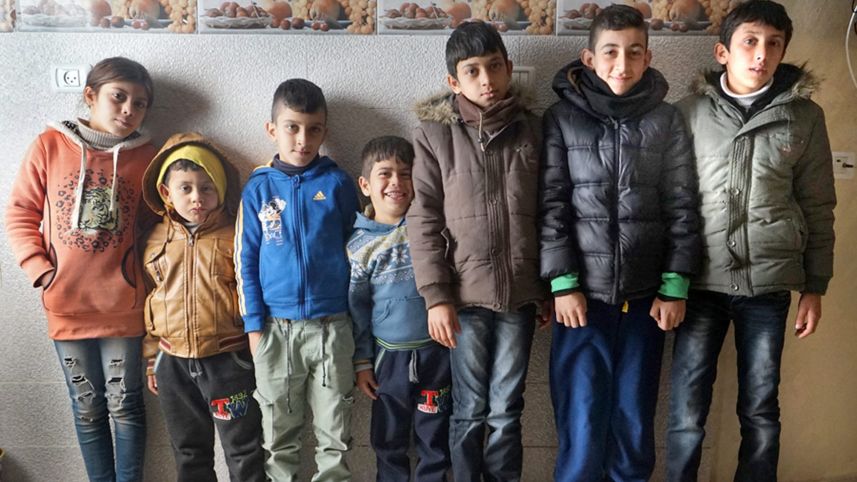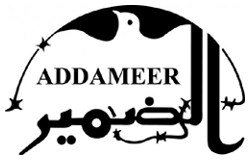
Kadum’s juvenile lineup, from left: Shahad, Mohammed, Muaman, Mahmoud, Maliq, Khaled, Tariq. Since the protests began, 85 residents, 11 of them children, have been hit by live bullets. Alex Levac
read more: http://www.haaretz.com/israel-news/.premium-1.764648
IDF soldiers burst into a Palestinian home after midnight, and awakened two boys to warn them not to take part in protests. On their way out, they tossed stun grenades into neighbors’ yards.
It was just after midnight on Thursday, last week, at the Shtaiwi family’s new home in Kafr Kadum, not far from Nablus in the West Bank. The occupants – mother and father and five children – were all asleep. Suddenly a loud noise was heard from the street below. The father, Hikmat, woke up. He heard steps, then loud pounding on the back door. Looking out the bedroom window, he saw a large group of Israeli Defense Forces soldiers, about 30 of them, below. They knocked on the iron door, shaking it and shouting, “Open up, open up!” He went downstairs, opened the door. Four armed, masked soldiers rushed into the house and asked, “Where is Tariq?”
The wanted individual, Tariq, is a chirpy-voiced 13-year-old boy in the seventh grade. The eldest child of Hikmat and his wife, Iman, a construction worker and a homemaker, respectively. An officer ordered the soldiers to move Hikmat away, but the father told him that the children were asleep and that he didn’t want them to wake up to the sight of armed and masked soldiers. The officer agreed and allowed Hikmat to accompany the soldiers as they made their way through the rooms. They said that in addition to Tariq, they were looking for his brother Maliq, age 12 and in the sixth grade. By now the whole family had woken up, frightened, the children shaking with fear, their father recalled this week when we visited.
The two wanted individuals were sleeping in the boys’ bedroom, with blue walls and three beds, all of them blue, too. The girls’ room is pink. Tariq woke up in a fright. A soldier grabbed him by the arm. At this point seven soldiers were in the house. One of them took Hikmat to the living room and ordered him to sit on the floor. Six-year-old Mahmoud, in his father’s arms, began to cry, “Daddy, daddy!” Another soldier shut Iman in her room with her two daughters; as he did this, one of them, Shahed, 11, broke into tears. The two wanted brothers were taken to separate rooms, and the doors closed.
Tariq relates now that a soldier pushed him into a room and snarled at him, saying accusingly, “You took part in a demonstration and threw stones.” The soldier twisted his arm behind his back. They were alone in the room, boy and soldier. The soldier held Tariq’s face with his hand and looked at a photograph he had, to compare and identify; he didn’t let the boy see the photo, and pushed him away. Then he went through his pockets; the child was wearing pajamas with a coat on top.
Tariq denied throwing stones. “I got ready to be arrested,” the 13-year-old boy tells us, and laughs.
The soldier told him that this was a final warning: “The next time I see you at a demonstration I’ll shoot you or arrest you.” He ordered the boy to cross his hands behind his back and left the room, not before repeating, “This is my last warning.” Maliq underwent the same treatment in the adjacent room.
Were you afraid?
“Yes,” Tariq replies. “I was afraid when he grabbed my arm strongly, I thought he would arrest me. But what scared me most was the black mask on his face.”
Are you still scared?
“Sure I’m scared. Every time I hear something move outside, I say to myself: They’re coming. If I play outside with rocks, I wash my hands five or six times. [Soldiers check children’s palms for traces of rocks or soil.] I have a problem falling asleep at night. I keep thinking: They’re coming, they’re coming. And then I can’t get up in the morning.”
Early this week, Tariq had a geography test. “I don’t have any idea what I wrote,” he says, in his high-pitched voice. He remembers his grandfather telling once him that if you’re scared your hair turns white. Since the incident, he’s been pulling out hairs to check if they’ve gone white, and if he looks old.
Their father told the boys that he filed a complaint with the police, and was promised that the soldiers would not come again. That’s pure fiction, of course, made up by Hikmat to calm the boys. Mahmoud has been wetting his bed since the nighttime incursion. The soldiers spent about 40 minutes in the house. They didn’t conduct a search or take anything. Their only mission, apparently, was to frighten the children. Since then, the children, all five of them, have been sleeping in the parents’ bedroom, afraid to sleep in their rooms. At night, each passing car or barking dog startles them.
As the soldiers were leaving, they threw a stun grenade into the family’s yard and a few more, for no apparent reason, into neighbors’ yards as they made their way on foot out of the village.
One of the stun grenades was thrown into the yard of Murad Shtaiwi, Hikmat’s family’s neighbor, and the coordinator of the village’s regular nonviolent protests and the spokesman for Fatah in the Qalqilyah region.
Kadum’s residents are among the most determined in the West Bank. Their struggle is over the access road to their ancient and poor village, which has been blocked since 2003, because of the presence of the settlement of Kedumim at the far end. The alternative route to Nablus and its neighboring villages is lengthy and difficult. It’s of no consequence to the settlers in Kedumim, of course, but the village is being stifled because of them. Some 4,000 dunams (1,000 acres) of Kadum lands were expropriated for the use of Kedumim and its host of satellites and outposts, beginning with its establishment in 1975, and 11,000 dunams of village property lie in Area C, access to which requires prior coordination with the Israeli military authorities.
In July 2013, Kadum residents launched their nonviolent protest to demand to have access to their village restored to them. At first they held a demonstration every Friday; recently they’ve added another, on Saturday. They march along the blocked road, about 300 villagers, joined by a few Israeli and international activists. Since the protests began, 85 residents, including 11 children, have been injured by live bullets, many others have been hurt by rubber-coated bullets, and 170 have been arrested on a variety of charges, and jailed for periods ranging from four to 24 months. Fines totaling 250,000 shekels ($62,000) have been imposed on the villagers as punishment.
On December 23, during the villagers’ weekly demonstration over closure of the access road, soldiers arrested Murad’s 6-year-old son, Muaman. A photograph of the small boy, in custody among six hefty, armed IDF soldiers – he barely reaches to their knees – was posted on the social networks and stirred a furor. The child was released after half an hour.
Says Murad: “None of us hates his children. We do not send them into the streets. We love them the same way you [Israelis] love your children. On that day, Muaman was with me at the demonstration. I know him: When he sees soldiers, he runs. But that day there were no soldiers and he walked with me. He wanted to show his friends that he’s brave. He put on a keffiyeh and came with us.
“Suddenly we saw something strange in the bushes,” he continues. “Someone threw a stone into a bush and 10 soldiers jumped out of it, as though they came out of the ground. Everyone ran, but Muaman didn’t manage to get away and they grabbed him. Muaman is a weak boy. A soldier threw him to the ground and then picked him up. I saw it and went crazy. I started to shout, and I heard him crying: ‘Daddy, daddy!’ I passed out, and someone ordered an ambulance for me. They sat Muaman on their jeep and after half an hour let him go. The soldiers have big bodies and small brains: What are you thinking, arresting a little boy in front of the cameras?”
For the past three months, the army has not shown up at the Friday-Saturday demonstrations, and they have dispersed quietly. But over the past two weeks, the soldiers began to return, firing tear-gas grenades and rubber-coated bullets in large numbers, and also using live ammunition, according to Shtaiwi. The soldiers are more violent than ever, he adds. Last Saturday, one of their bulldozers damaged the village’s main water pipe, which was later repaired by the villagers.
We were here last year, too, in March 2016 – after Border Policemen shot Khaled Shtaiwi, Murad’s 11-year-old son. Video footage showed him lying on the sooty road – blackened by burning tires – and crying out for help. The police stated at the time, “The ‘boy’… is actually a disrupter of [public] order, masked, who was at the forefront of the violent demonstration.” Now the “boy” – who is indeed a boy – is cuddling in his father’s arms, along with his younger brother, Muaman. At their young ages, they’ve both already been arrested and and one of them has been wounded.
This week, according to Kadum villagers, the IDF raided local homes again in the dead of night, and attacked a woman of 80.
In response to a request for comment from Haaretz, the IDF Spokesman’s Office issued the following statement: “Last Thursday, as part of the activity of IDF forces in Kafr Kadum, in the course of their entry into one of the houses, soldiers spoke with youth who had taken part in one of the regular demonstrations in Kadum. As they were exiting the village, there was a throwing of rocks and a gathering of Palestinians in the direction of the force, which responded with crowd-dispersal techniques.”




